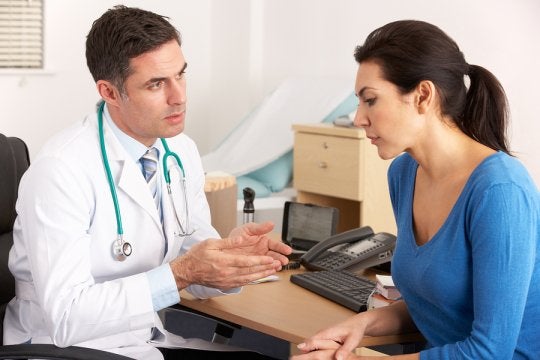-
The STD Testing Process
In most cases, early STD treatment helps to prevent long-term complications, so it is important to talk to your gynecologist about STD testing. Your gynecologist will ask you questions about your sexual health history and current relationships to determine what type of STD testing is right for you.
Watch this video to learn more about STD testing. Most tests can be completed simply by taking a small sample of cells, examining any vaginal discharge that is present, or performing a blood or urine test.
For STD testing in Washington, D.C., visit Washington Surgi-Clinic . We offer fast, confidential women’s health services, including STD testing and treatment. To make an appointment, please call (202) 659-9403.
-
When to Get STD Tested
Sexually transmitted diseases, or STDs, are diseases that can pass from one partner to another during sex. STD testing is fast and easy, and typically only requires a blood sample, urine sample, or small tissue sample, such as a pap smear. There are several reasons to schedule STD testing, such as seeing a new sexual partner or engaging in sexual activities with several partners. Additionally, if you have had unprotected sex with a partner that has not undergone recent STD testing, it’s also a good idea to contact your gynecologist for an STD test. Because many sexually-transmitted diseases do not cause immediate or noticeable symptoms, it’s important to get tested even if you have not developed any new or concerning symptoms. Even if you are in a monogamous relationship, you may still wish to get tested once a year during your gynecological exam for convenience.

Washington Surgi-Clinic offers STD testing and STD treatment as part of our gynecology services near Washington, D.C., including testing for chlamydia, gonorrhea, syphilis, herpes, and HIV. You can learn more about STD testing, birth control, and reproductive health on our website, or call (202) 659-9403 to speak with a staff member today.
-
What You Should Know About Gonorrhea
Comprehensive gynecology services near Washington, D.C., include testing for sexually transmitted diseases. There are many different kinds of STDs, and some have no symptoms or side effects. STD testing is therefore required to make sure men and women maintain superior sexual health—and are not inadvertently passing on diseases to their partners. Gonorrhea is one STD that can be identified in standard STD testing. Keep reading to learn what you should know about gonorrhea, including common symptoms, simple testing, and effective treatments.

Common Symptoms
Most women who have gonorrhea never experience any symptoms, so they do not know they have an STD until they visit their gynecologist for STD testing. In contrast, 95% of men do experience gonorrhea symptoms. If you have a male sexual partner who is experiencing discharge, soreness, or swelling in the penis or testicles, cease sexual activity and visit your gynecologist for STD testing. Women may also experience burning in the throat when performing oral sex on an infected male.
Simple Testing
Gonorrhea is conclusively diagnosed with STD testing at an office that provides gynecology services. STD testing for gonorrhea is extremely accurate. The most common tests involve either urine analysis or testing of a sample of body fluid. For example, women may be tested in areas where infection might be present due to sexual activity. Body fluid can be collected from the urethra, cervix, rectum, or throat.
Effective Treatments
STD treatment for gonorrhea usually involves two antibiotics. A gynecologist will inject one medication called ceftriaxone. The other medicine is called azithromycin and comes in pill form. By taking your antibiotics as prescribed and completing the entire dose, you can permanently rid yourself of gonorrhea.
Do you need STD testing? For STD testing and all your gynecology services needs, contact The Washington Surgi-Clinic today by calling (202) 659-9403. You can arrange a confidential appointment with an experienced gynecologist, who will address all your sexual health needs and concerns. We also offer both first trimester abortion and second trimester abortion .
Recent Posts
Popular Posts
categories
- Uncategorized
- STD
- Washington Surgi-Clinic
- Abortion
- Pregnancy
- Pap Smears
- Birth Control Options
- HPV
- Gynecologist
- Pregnancy Test
- Abortion Safety
- IUD
- Pregnancy Termination
- First Trimister
- Cervical Cancer
- Morning After Pill
- Birth Control Pills
- Chlamydia
- Birth Control Shot
- Gonorrhea
- STD Testing
- Birth Control Implant
- Pelvic Pain
- Birth Control Patch
- HIV
- HPV Vaccine
